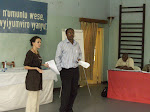Khartoum
Although we only came here just over a week ago, it really feels like we’ve already been away for months – this could be interpreted as good or bad (there are plenty of both in Sudan). Khartoum where we spent our first few days is more African than Middle Eastern, although Arabic is written and spoken everywhere and you can pick up falafel and swarma’s on many a street corner, life seems to move at a snails pace and like in Nigeria you are incredibly dependant on other people to get things sorted -you always need to form relationships with local people quickly so they can sort them out for you such as trying to get hold of our freighted luggage (a now long running issue that seems to have needed at least five people to rectify). Apparently Sudan is the most bureaucratic country in the world! You need a permit to do almost anything from travelling around to taking photos and this all takes time, however, the atmosphere in Khartoum is very friendly and relaxed and although you can’t always get the amount of work done you might have hoped, there is always someone on the street who is keen to stop you and tell you their life story.
Malakal
To reach Malakal is not particularly easy - all of South Sudan is very much in the early stages of being a post-conflict environment and you can only really reach Malakal by flying with WFP (the World Food Programme) and these flights are restricted to UN and NGO workers. Civil war raged across the South almost continuously from Sudan’s independence in 1956 until the Comprehensive Peace Agreement was signed in 2005 making it Africa’s longest running conflict, UNMIS (United Nations Mission in Sudan) has a base here and there are around 3000 peace keeping troops stationed in the area. First impressions of Malakal - Heat, Dust and Insects – lots of them! Every time you walk out the word Khawaja echoes around the streets, in Arabic meaning ‘foreigner’. Everyone we meet is convinced we are brother and sister (twins) and we have even been asked if we are father and daughter (this came as a bit of a shock!), maybe we are also related to all the other white people in town as we all look the same to many people.
We have been staying with the Bishop of Malakal and his family, he is a Dinka Bor and many of his team who we shall also be working with are Dinka. He and his wife have seven lovely children, there are however over 20 extended family members staying in his home some who have to sleep outside. It’s taking time to get used to using pit latrines! especially ones which barely hide you from the view of others. I think I’ll be constantly trying to find excuses to go and see the UN in order to use their fully flushing toilet complete with toilet paper and working taps. People eat twice a day, usually at 11am, usually bread and fuul (beans) with some onion and maybe cheese and them some time in the evening – this has been things like semolina with rice and milk, sometimes a meat broth with a dough-like starch based carbohydrate. We are always made to eat separately from the family – we are told it is traditional for guests to eat alone, I feel that maybe part of this is that the food we are being served is better than that which the family eat. The bishop has so many pulls on his time, there are constantly people here asking for help, his wife Rebecca works incredibly hard, looking after seven children, running a small tea shop and having to provide food for the 20 odd relations who seem to live here on and off and other visitors including ourselves.
The school building program, part of which it is our work to support consists of building 2 schools in two remote areas of the diocese and adding some classrooms to Malakal Basic school which is in the town itself. We have spent the week meeting and getting to know everyone involved in the programme. We have been eating at different peoples homes most evenings, usually congregant members, unfortunately very few of them speak English and I find the Arabic here really hard to understand so we sometimes end up all sitting around looking at each-other in silence. Logistics are very hard here, getting the smallest thing done at all let alone at an agreed time is almost impossible. 2 favourite words in Sudan are undoubtedly inshalla (God Willing) and bokra (tomorrow), meetings and arrangements are constantly postponed, we have no internet access and are not yet sure how to resolve this. Our mobile phones rarely work so when we need to speak to someone we have found ourselves searching the town trying to track them down. Looking for accommodation has proved tough, because there is a large UN peacekeeping mission here the price of even the most basic accommodation is very high and there’s very little available. We have been in negotiations for one house and have just secured it but it needs more work doing to it than our budget allows for so when we move in we just hope that it will have a decent roof and secure front door.
We leave Malakal tomorrow hopefully having agreed our work plan for the next few months with the Bishops Team. We will be flying back to Khartoum to try and arrange a long stay visa and then going to Renk for a week, the other diocese where we will be working.
Will be in touch again soon
Keren and Simon x
Thursday, 15 February 2007
Subscribe to:
Post Comments (Atom)


No comments:
Post a Comment